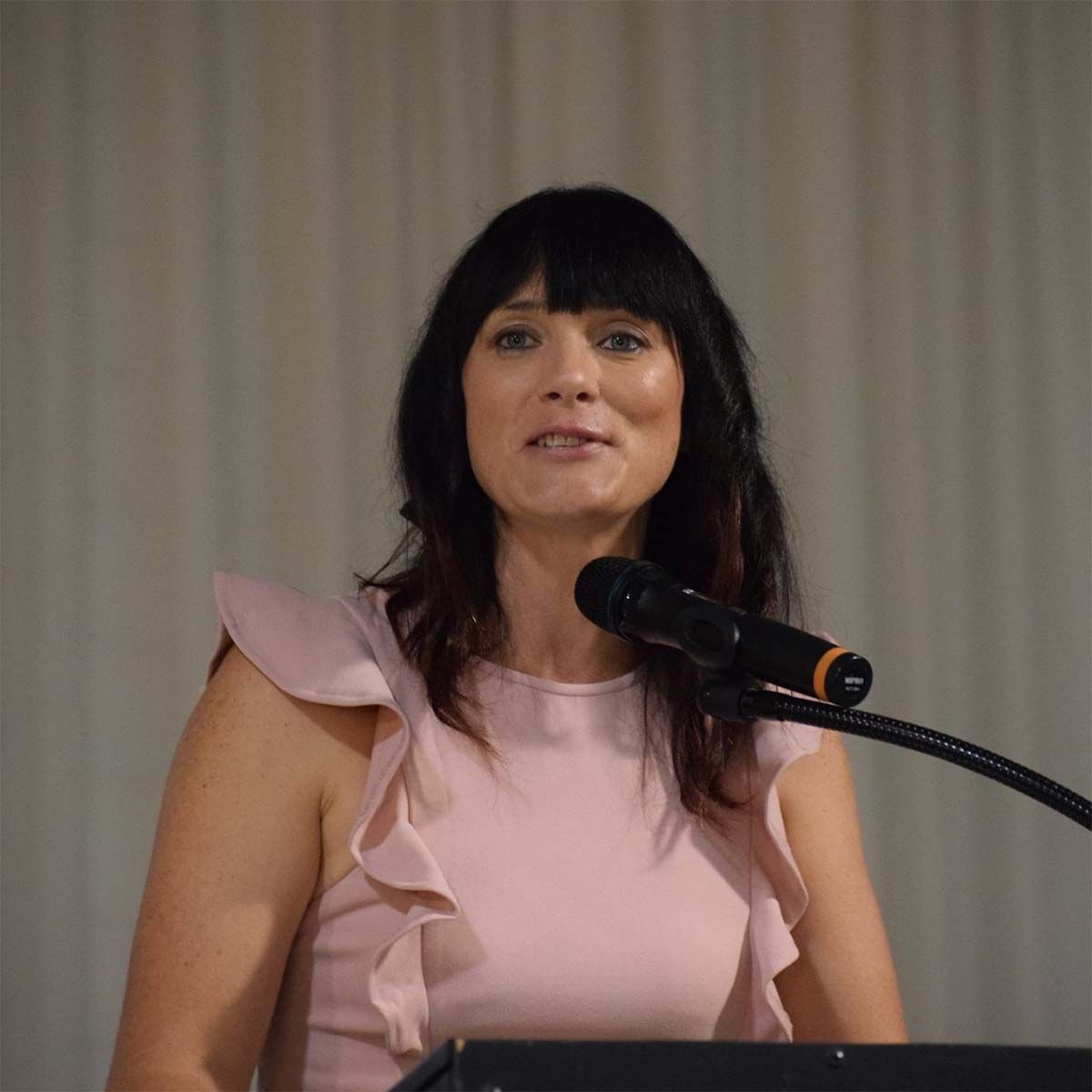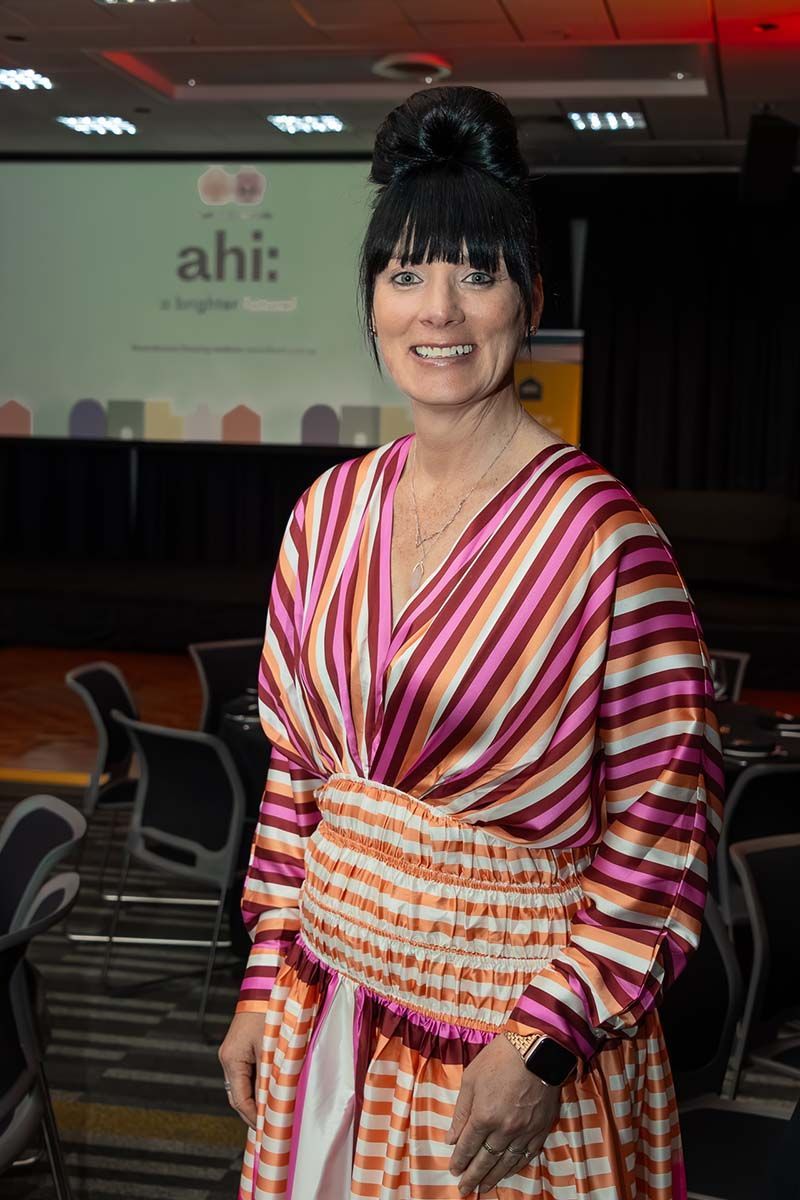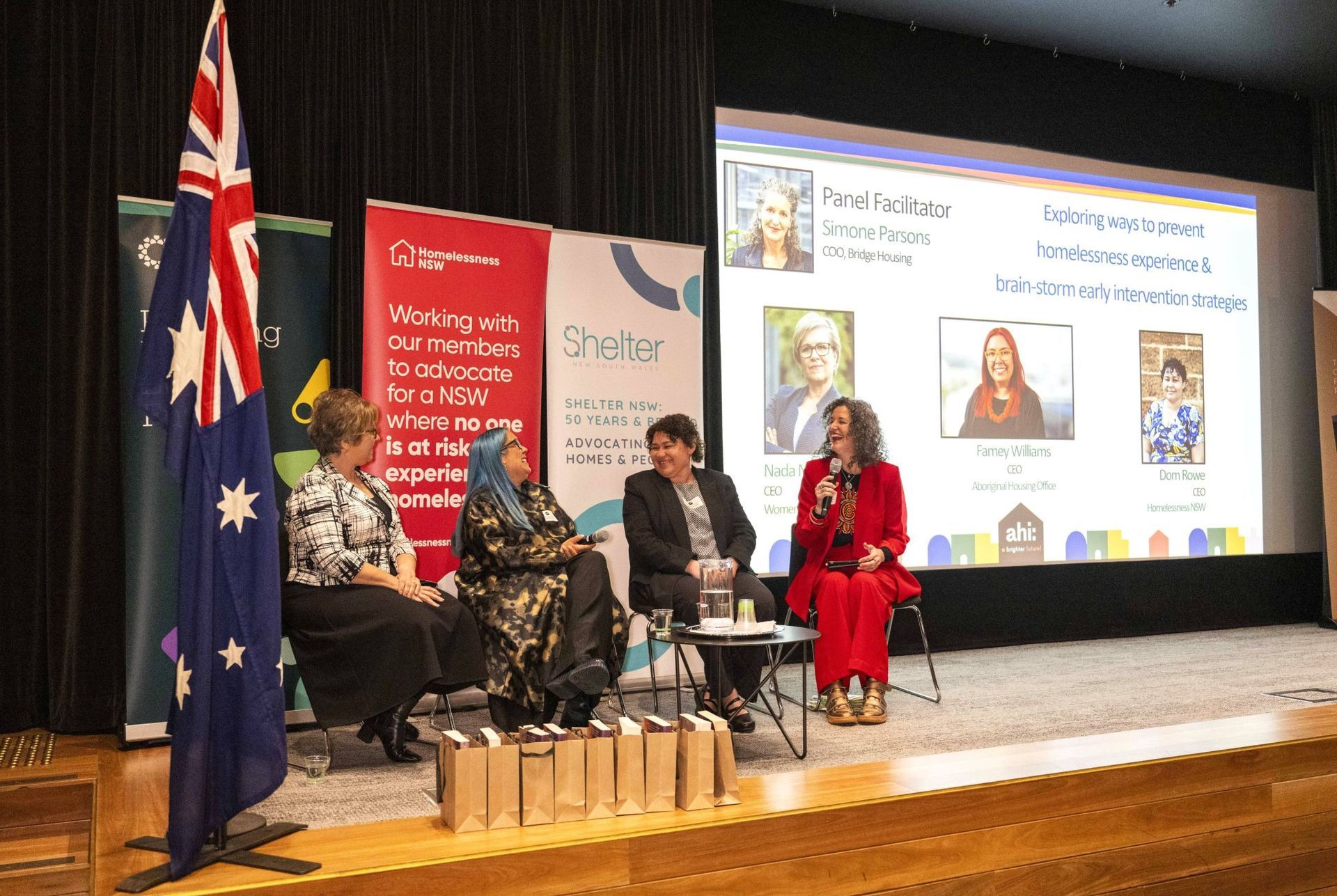With more than a quarter of a century in the community services and social work sector, new ahi: CEO
Kellie Dunn shares her insights into sector leadership.
Good leadership requires ‘humanness’
Kellie’s a firm believer that good leadership comes from being aligned emotionally and professionally to what you’re doing.
“The most important part of the conversation that I think is critical around sector leadership is that it doesn't matter what title you've got; it's about who you are, and what you bring to the role. But [also] it’s about what the role brings to you,” Kellie explains.
“When I look back and focus on strong leaders that I've had around me—and the times where I've been a really strong leader—there’s been a congruency between who I am, the role that I'm in, and why I'm doing it, and the humanness that comes with that. I think that's something that really good leaders in sector leadership provide – a safety, nearly, in being human, bringing all the things that are good, bad and ugly to the table to talk about and discuss, and then being committed to finding ways through that.”
Kellie believes the difficulties associated with getting people into safe, affordable and sustainable housing mean the sector needs capable leadership now more than ever. And, for her, there’s no shortage of people in the social and affordable housing sector who have ‘the right stuff’.
"This is a sector that's being constantly told it's in crisis... So, the leaders that are required at this particular time is exceptional."
“This is a sector that's being constantly told it's in crisis: the greatest amount of people experiencing homelessness; the greatest amount of people being displaced from having safe and secure housing because of the rental crisis; natural disasters like floods and fires; and there just not being enough houses to go around for everybody. So, the leaders that are required at this particular time is exceptional.”
She cites Rebecca Pinkstone, former CEO of Bridge Housing, and now the newly minted CEO of Homes NSW, as a prime example of the sector leadership required today. A former participant in the ahi: Mentoring Program, Rebecca worked her way through an organisation in an industry she felt a deep affinity, as well as a congruency between her values and professional ambitions.
“Rebecca's just blossoming and flourishing as a natural leader that people can look to, to feel safe and secure in making good decisions for the sector, and she's challenging as well, you know?” says Kellie. “She's happy to hold someone accountable for a question they've asked, or for a direction they've taken and trying to understand why they're doing that. She epitomises to me what a strong leader is, and what we need in the future moving forward.”
“So, I think that ‘humanness’ and being deeply connected to the work—knowing why you are here and why you're doing the work that you're doing—are critical elements for leaders now in the housing sector. Leadership itself hasn't changed in terms of the natural elements that make a good leader. The qualities that enable you to lead during a time of a crisis, just as effectively as when it’s business as usual, fundamentally don't change.”
“We all strive to feel grounded and connected; they're human needs,” she stresses. “But sector leadership also now needs to really listen to what people need from you as a leader now, and into the future, as opposed to what they needed from you 10 years ago.”
Tough times don’t last, tough people do
The work required to bring the ahi: back from the brink has been intense. While the crisis part of the rebuild is over, the work continues. It’s reinforced Kellie’s belief that it’s essential any kind of transformation an organisation undergoes has to be viewed as a marathon, not a sprint.
“I stepped in as Interim CEO at a time when we were in crisis and needed to understand what we were dealing with, and then how we—the Board, the ahi: team, the network and our membership—moved through it,” Kellie details. “It wasn't just about what we thought behind closed doors should happen; it was also about how important it was to show up in ways for our membership that makes the strategic direction we need to work towards remain fundamental to the people that need us the most.”
“If I'm brutally honest—which I think is a quality of really good leadership—we need to understand [the recovery] is a process. One of the qualities that I’ve seen in the people around me, and who are supporting me – like our Board; our
previous President, Jamie [Muchall], our
current President, Sean [Kelly], the committees, and the leaders in each of our branches is grit.”
“Grit is a really important skill, attitude and mindset that leadership now requires of me and everyone at the ahi: – the grittiness to roll your sleeves up, sit down and talk to people about what's needed,” she continues. “And then strategically taking all that and turning it into something that adds viability to the business and helps us attract people to follow our journey—whether that's corporate sponsors, governments or individuals.”
"It's also important to Kellie that the tenant perspective isn’t lost."
It's also important to Kellie that the tenant perspective isn’t lost either. She admits the grittiness she’s talking about extends to listening to what people who are going through the social and community housing experience are telling providers they need. This means the ahi: can then deliver programs that offer real value to industry professionals.
“Listening has been really critical, and that grittiness has been a quality and a strength that I've definitely called upon,” she says. “I was involved with Lifeline as an employee and as a volunteer on the phones for many years. And it was the phone calls, and sitting with people at their greatest time of mental and emotional overwhelm that drew me very much into the brand of Lifeline. Every time I did something as a professional for Lifeline, it was because I knew it could have a positive effect for somebody who was ringing. In this role in the housing sector, it's different because I'm not greatly affecting a tenant's life by what I do today, but what I do greatly affects a housing professional's life and how they relate to their tenant.”
Round up your posse
As well as having an emotional alignment to what you’re doing and relishing the opportunity to roll up your sleeves for the long haul, an important part of sector leadership for Kellie is to connect the people who believe in what you’re doing.
“When I first stepped in as the Interim CEO, I felt like there were a few people running with us and then, maybe about a month later, those people brought more people, and then those people have brought more people — to the point that it felt like we've got a movement, this posse of people. That's when the Board, myself and the staff just went, 'Yes’! People do understand, and people want to keep what we hold here sacred' because we are the only peak body in Australia that do what we do. But I think the reason why I'm talking about that is because it then lends to another quality: belief. I could feel the belief in what I was doing grow stronger. And it came from that connection and the grittiness and all of that.”
"What I’ve talked about with people in team sports is you can always borrow belief. Even if you don't believe you’re necessarily the right person at that time to get the job done."
"A case in point is
HousingWORKS... Kellie explains that its absence was felt more keenly than originally anticipated."
A case in point is
HousingWORKS, within which you’re reading this interview. Kellie explains that its absence was felt more keenly than originally anticipated.
“It was critical for our sector,” she says. “And when they didn't have it, that's when the members really understood what they missed. We had to understand what it was about that drew them to
HousingWORKS. Was it the physical publication in their hands or was it the other things?”
“And so, that was a really important turning point for myself and the Board when we said that it’s got to come back – but how do we do that when we don't have a lot of funds? That's where we had to dig deep for that belief and say, ‘We've got to make it happen’.”
Similarly, she stresses that the people “backing away”, as she describes them, need to be recognised as well: “Whether it's a sporting group, whether it's a business, a not-for-profit, a teacher in a school, or a nurse in a hospital environment, you have to work out who are the right people from a values and belief set, and also those who are going to show up and do the work for you and with you. It’s critical because a lot of people say ‘yes’ but, when it comes down to it, can they roll up the sleeves and do what's required and show that grittiness? So, I think being a good leader, you need to understand that too.”
TV’s
Ted Lasso: an incidental course in leadership and management
One of the most critically and commercially successful shows in recent years is the Apple TV produced comedy/drama
Ted Lasso.
A classic fish-out-of-water story, the show is about the exploits of an easy-going and successful college football coach from the United States recruited by the owner of a soccer team in England — AFC Richmond. The new owner, Rebecca, has gained control of the club as part of the divorce settlement with her ex-husband, Rupert. Determined to destroy the club and further compound her ex-husband’s misery, Ted’s selection as manager—a role for which, never having coached soccer before, he’s clearly unqualified—is a key part of her strategy to kill off the club. But Ted and his assistant coach have other ideas.
While it’s great entertainment, many of the story arcs that occur across the show’s three seasons contain some brilliant examples of leadership; including elements that Kellie sees as essential in sector leadership.
“Oh, I could talk about
Ted Lasso forever,” she laughs. “The thing that I loved the most about watching the show—and soccer is a sport that I don't enjoy watching normally—was that it was about the humanness of how people come together for the common good."
"In the human tapestry of life, we're all different. When we’re woven together, there are pieces of us that will stand out, and there are pieces of us that will blend in."
“In the human tapestry of life, we're all different. When we’re woven together, there are pieces of us that will stand out, and there are pieces of us that will blend in with everyone else, if we're in the right tapestry. But also, you can't be that someone who sticks out all the time, and you can't blend in all the time because otherwise you lose yourself and people stop listening to you. It's like in music – the silences in between notes are just as powerful, in fact probably more powerful, than the notes themselves.”
“So, I think leadership is about understanding that it's maybe not necessarily about having all the right skills and tools at your fingertips every time, but rather, knowing when an opportunity presents itself. Ted Lasso was brought there to fail but against the odds. His humanness and his ability to bring people along on the journey and help them feel safe and secure, and find ways through problems and laugh when something goes wrong, is powerful for him. It drives the people around him.”
“In this sector, if you’re not here to support people finding safe and secure and stable accommodation in whatever way, shape or form that looks like – whether you’re in admin, finance, tenancy work, project management, board, CEO, whatever that is – if you don't understand other people's pieces and what they're supposed to look like, it is not going to work,” Kellie clarifies. “The picture's going to be a mess.”
Flight, fight, flee – and now flock
The pandemic changed the way many of us see the world and our place in it. Whether people choose to acknowledge it or not, the early days of the virus – with experts struggling to understand what they were dealing with, followed by mounting hospitalisations, deaths and lockdowns – impacted everyone to varying degrees. It’s a phrase that’s been overcooked since the world has gradually returned to something resembling normality but there will be an immeasurable amount of ‘learnings’ that will come out as sociologists and a range of other disciplines study COVID’s impact on society.
One of the things that has come to light – thanks to the work of social worker, researcher and anthropologist Brené Brown – is an addition to the trauma reaction cycle, as Kellie explains: “We talk about trauma reactions, which are fight, flight and flee. Brené Brown and her team discovered that another trauma response is flock: we go to our people.”
"That’s when the penny dropped about my greatest learning experience from the global pandemic as a leader. It's about bringing people together."
“For me, that’s when the penny dropped about my greatest learning experience from the global pandemic as a leader. It's about bringing people together, and helping them achieve the greater good or the greater vision. At times, it's not going to be easy, but sometimes, it's joyful and it's energising and it's incredible. It's the most beautiful ride when you get it right. And I think that, for me, as a leader right now, fundamentally is what drives me in every decision that I'm making: is it for the good of the flock? Who are my I flock? Who am I going to, and are they the right people? And is it changing over time?”
“As a female leader in this space, I've grown through some examples of really terrible leadership and some really amazing leadership by all genders,” Kellie admits. “But I’m at an age where I'm now discovering who I am more and more, and borrowing some of the things that I'm learning and reading and seeing. I'm using my professional development to develop into the leader I will need to be for this organisation and any other organisation. Also my flock: my family, my community. My number one job at the moment is to understand who am I as a leader in these spaces.”
“I'm not saying I'm perfect at it, or there are not times where I think, 'Oh man, I'd rather just finish the race right here, thanks,” Kellie laughs, “but this work really reminds me about grittiness, and the importance of the connection to why you're doing what you're doing.”
Kellie’s time so far as ahi: CEO has, by necessity, reduced the amount of direct contact she has with clients and frontline workers. This shift has also given her the opportunity to shift her thinking.
“I originally entered the social work field to help people,” she concludes, “so being one step away from the client group has made it important for me to understand what connection I have to the work that I'm doing as CEO. Whose life am I changing for the better if I'm able to be the leader that I know I can be for this organisation?”
If her past form is any indication, we can't wait to see the leader Kellie is sure to become.








